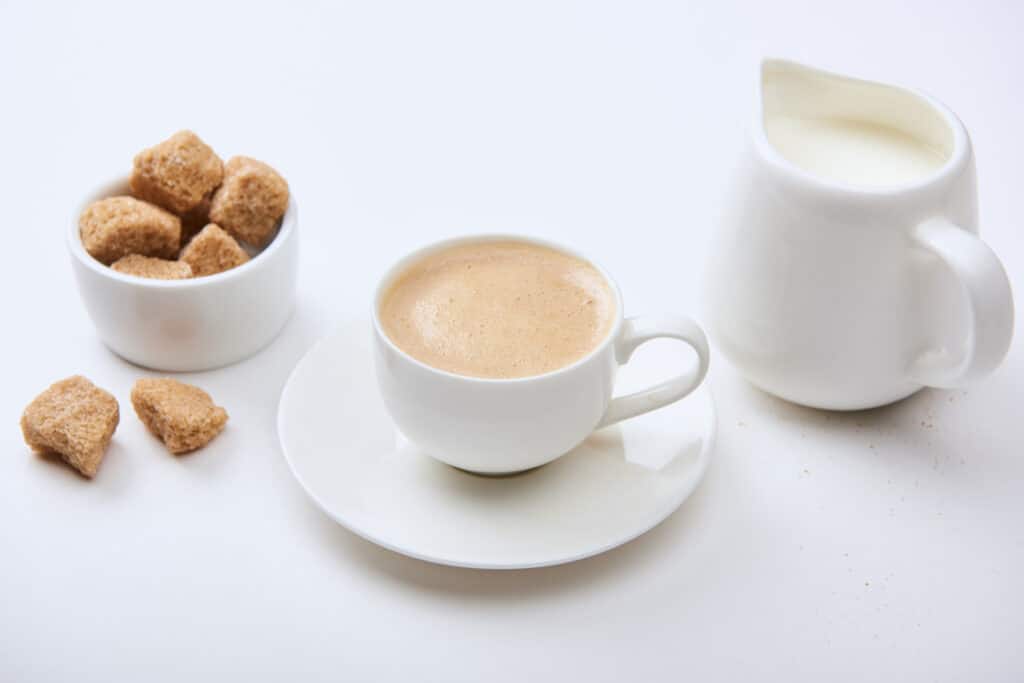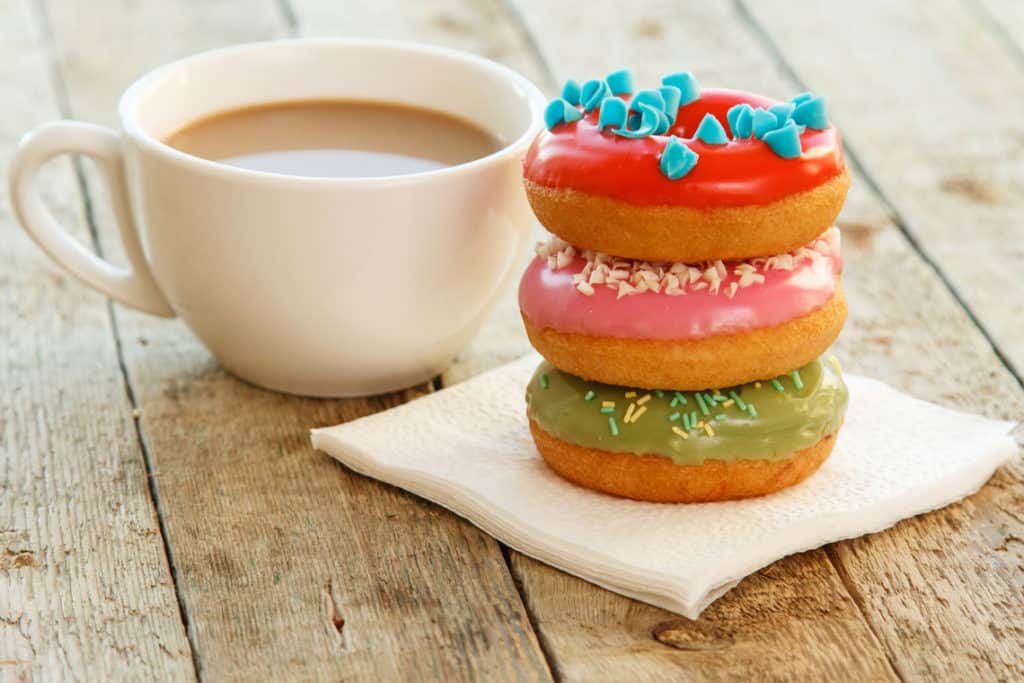Coffee is one of the most popular beverages in the world. The United States is one of the leading consumers of coffee, where an average adult drinks 3 cups of coffee per day.
Most people enjoy coffee because of its stimulating effect and its delicious taste and aroma. But what about its impact on your health? its popularity is mainly attributed to its invigorating effect, which is produced by caffeine, an alkaloid present in coffee
Is coffee good for your health?
Yes. When consumed in moderation (3-5 cups per day or the equivalent of up to 400 mg of caffeine), coffee consumption is beneficial for most adults.
In the past, coffee was believed to be a possible carcinogen. Many scientific studies that supported this conclusion didn’t discriminate between people who drink coffee and people who smoke. It turns out that coffee drinkers are more likely to be smokers than non-coffee drinkers. Researchers were measuring the combined effects of drinking coffee and smoking, which was misleading.
Research in recent years, with more advanced methodology, has consistently found that coffee is not only not detrimental, but that it has many benefits for your health. In a June 2016 report, the World Health Organization officially removed coffee from the list of potentially carcinogenic foods.
Coffee is much more than a “caffeine-delivery-system”
Coffee is a complex mixture of more than 800 volatile compounds. Its composition varies depending on how coffee beans are processed. Caffeine is the most known and most researched component of coffee, but it’s not the only one that offers benefits for your health.
Coffee has a lot of polyphenols, like chlorogenic acids. Polyphenols are micronutrients with antioxidant and anti-inflammatory properties, which are found abundantly in plants.
Benefits of drinking coffee
Coffee is the most widely consumed psychoactive substance in the world. The critical advantage, when compared with other psychoactive substances, is that coffee is legally available everywhere, and it’s considerably less risky to your health.

1. Coffee helps you stay awake and focused
A moderate amount of caffeine can wake you up, boost your mood, energy, alertness, concentration, and it can even improve athletic performance.
2. May help you live longer
“The evidence is pretty consistent that coffee is associated with a lower risk of mortality”
Erikka Lotfield, research fellow at the National Cancer Institute
3. May lower your risk of type 2 diabetes
A study from Harvard University shows that when compared with not drinking coffee, consuming 6 cups of coffee per day was associated with a 33% lower risk of type 2 diabetes. This lower risk appears to be the same for both men and women.
4. Helps protect your liver
Over the past 20 years, an increasing number of epidemiological and experimental studies have demonstrated the positive effects of coffee on chronic liver diseases. We don’t know if this effect comes from caffeine. However, there is evidence that chlorogenic acid, which is one of the components of coffee, helps protect your liver.
5. May lower risk of cardiovascular disease
A meta-analysis published in 2014 concluded that moderate coffee consumption (3–5 cups/day) was associated with a lower risk of cardiovascular disease (CVD), and heavy coffee consumption (≥ 6 cups/day) was neither associated with a higher nor a lower risk of CVD . Cardiovascular diseases include heart attacks, strokes, and other medical problems with the blood vessels that supply the heart muscle.
6. May lower risk of Parkinson disease
Drinking coffee may help reduce the risk of neurodegenerative diseases, including Parkison’s disease. This effect is less in women.
7. May lower risk of certain types of cancer
Coffee contains antioxidants, which we believe have a protective effect against cancer. Some recent studies show that drinking coffee is associated with a lowered risk of prostate cancer, liver cancer, endometrial cancer, and some cancers of the mouth and the throat.
However, in some of these studies, the benefit is found when people drink 4 to 6 cups of coffee a day, which may cause unwanted effects like insomnia, headaches, and some digestive problems.

8. Coffee is a dietary source of some vitamins and minerals.
Coffee contains some micronutrients (vitamins and minerals), in particular vitamin B2, magnesium, and potassium. For example, an 8 oz cup of brewed coffee contains approximately 11% of the vitamin B” (riboflavin) dietary requirements for adults.
Possible disadvantages of coffee
In excess, coffee, and more particularly, caffeine, can cause problems. Caffeine in excessive amounts can kill you or threaten your life, but this requires caffeine-containing medications.
One teaspoon of powdered caffeine is equivalent to about 28 cups of coffee. This much caffeine, consumed in a single serving, can cause serious health problems and possibly death.
The intensity of the effects of coffee is not the same for everybody. Some people experience adverse reactions to standard doses of caffeine. These reactions may include: tachycardia, insomnia, restlessness, nervousness, headache, and diuresis
Because caffeine is addictive, there are withdrawal symptoms, which can be reduced or avoided if withdrawal is gradual. Withdrawal symptoms may include: headaches, fatigue, drowsiness, difficulty concentrating, and depressed mood.
How much coffee is safe to drink?
Drinking up to 4 cups of brewed coffee or up to 400 mg of caffeine per day is considered safe for most healthy adults.
Are there people who should severely reduce or avoid drinking coffee?
Yes. Some groups of people will be better off if they limit their consumption of coffee, or avoid it altogether.
- People who are highly sensitive to caffeine, who can’t tolerate small amounts without having adverse effects.
- People with glaucoma. There may be a small effect of increased intraocular pressure with caffeine consumption, although there is no evidence that this effect is clinically significant.
- People who have epilepsy
- People who suffer from high blood pressure
- Pregnant women. Coffee can elevate the heart rate of the unborn baby, and also because some studies suggest that drinking too much coffee could slightly increase your risk of having a miscarriage. Recent studies also show that it’s generally safe for pregnant women to drink one or two cups of coffee or caffeinated beverages a day.
- Children. We don’t know much about the impact of coffee in children, because there are very few scientific studies involving children consuming coffee. But we do know that children are more sensitive to the effects of coffee because they have a smaller body size.
- People who are taking medications or supplements which interact negatively with caffeine, like ephedrine or echinacea.
- People who have trouble sleeping, particularly a few hours before sleep time. You already knew this, of course.
- People who are advised by their doctor to reduce or eliminate coffee. This one goes without saying, but you should definitely listen to your doctor.
Does it matter how I prepare my coffee?
Yes. The concentration of the components present in a cup of brewed coffee varies according to the type of coffee beans, degree of roasting, method of preparation, and how strong you like your coffee. Roasting, for example, reduces the amount of chlorogenic acids but produces other antioxidant compounds.
There is some evidence that drinking filtered coffee is better for your health than boiled or pressed coffee. There are oils present inside the coffee beans containing diterpenes like cafestol and kahweol, compounds called diterpenes. Diterpenes may raise LDL, the bad cholesterol, and slightly lower HDL, what’s known as the good kind. This effect can be avoided by drinking coffee filtered with paper filters, which removes most of the coffee oils.
Does adding milk or sugar cancel out the benefits of coffee?
A scientific study from 2006 says adding milk to coffee has no significant effect on the antioxidant powers of coffee, while more recent research from 2011 suggests the opposite, that is, that the addition of milk in coffee reduces its antioxidant properties. We don’t know if this is a small reduction or a more significant reduction.

What we do know is that if you add a lot of coffee and sugar to your coffee, this increases the total of calories, and this can have a noticeable effect in managing your body weight. Therefore, as always, we recommend moderation in how much sugar and milk you consume.
I love my coffee with a little bit of milk, and I have trained myself to enjoy it without sugar.
Can I get the same benefits of coffee by drinking decaf?
Yes, because decaf coffee contains similar amounts of antioxidants as regular coffee.
Unlike what most people think, decaf coffee is not entirely caffeine-free, but the amount of caffeine is minimal compared to regular coffee. A typical cup of coffee (240ml) has around 65-120 mg of caffeine, while the equivalent of decaf contains only around 2-3 mg.
Should I be drinking more coffee?
Most people can safely enjoy moderate coffee consumption of up to 4 cups of coffee per day (around 400 mg caffeine as part of a healthy, balanced diet and an active lifestyle.
For specific cases, remember to follow the advice of your physician.
Last Updated on May 31, 2023 by Cristina Vélez

